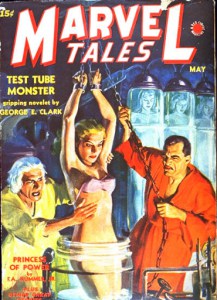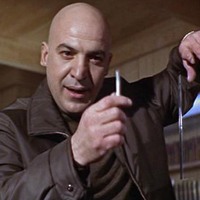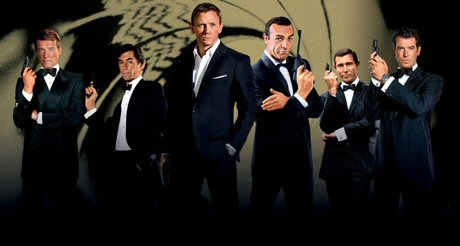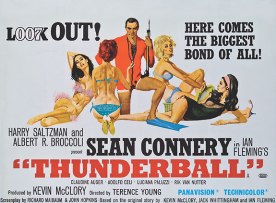 If you are able to vote for the Hugos this year, then you both know about the Retro Hugos, and you know your time is running out. We’ve only days left to nominate in a lot of categories, and that’s tricky when besides 2016, we’ve got 1941 to deal with. So, if I can offer my humble assistance, here are my thoughts and recommendations for the Retro Hugos. I won’t be talking about Semiprozine as I can’t even guess what counts in that category vs prozines vs fanzines. And also I’m skipping Related Work. I wish I wasn’t, so if anyone has some suggestions on Related Work, please let me know ASAP. Now, onward:
If you are able to vote for the Hugos this year, then you both know about the Retro Hugos, and you know your time is running out. We’ve only days left to nominate in a lot of categories, and that’s tricky when besides 2016, we’ve got 1941 to deal with. So, if I can offer my humble assistance, here are my thoughts and recommendations for the Retro Hugos. I won’t be talking about Semiprozine as I can’t even guess what counts in that category vs prozines vs fanzines. And also I’m skipping Related Work. I wish I wasn’t, so if anyone has some suggestions on Related Work, please let me know ASAP. Now, onward:
1941 Retro Hugos: The Fan Categories
Fan Writer:
Forrest J Ackerman
Ray Bradbury
H. P. Lovecraft
Donald A. Wollheim
Bob Tucker
Fanzine:
Futuria Fantasia (Ray Bradbury)
Monsters of the Moon (Forrest J Ackerman)
Science Fiction Progress (John Michel, Donald A Wollheim)
Sci-Fic Variety (Bob Tucker)
Snide (Damon Knight)
The fan categories do not work well in the Retro format, and I have left out Fan Artist and Fancast, and bet that almost everyone will do the same. Fan activates are of a time, and without context, they mean little. The zines mean even less because so few have survived. Fan writing is important for what it does to the fans that year, and it is hard to guess now. Even in 1941 is was uncertain as there was an attempt to index all the fanzines and it failed. Add in that they changed names from month to month, or the same person would do several, and you have a mess. The best we can do, if we really want to do anything, is give a nod to those where the people later became major movers and shakers in the fan community (like Ackerman and Tucker) or became important writers or editors (like Bradbury, Kuttner, Wollheim, and Knight). If any Fanzine stands out, it is Bradbury’s Futuria Fantasia which published short-shorts and flash from himself, Heinlein, and several other soon to be important authors.
1941 Retro Hugos: Professional Artist
J.W. Scott
Hubert Rogers
Virgil Finlay
Margaret Brundage
Ed Cartier
Going through cover art from the ‘40s, the works seem to only thrill me for a moment, and greater inspection leaves me cold. Even some of the “biggest names,” now largely forgotten, seem to have been just churning out simple quick pics. Still, a few stand out. I am taken by Scott’s work on Future Fiction and Marvel Tales (see the pic above). Roger’s work for Astounding is a notch above the rest as well. The rest are simply a bit better than the average. Brundage, one of the few women artists working in F&SF and frequent pinup painter, is my favorite artist of the five I’m recommending, but 1940 does not seem to be a great year for her.
1941 Retro Hugos: Editor, Short Form
Frederik Pohl
Raymond A. Palmer
Dorothy McIlwraith
John W. Campbell, Jr.
Mort Weisinger or Malcolm Reiss.
A pre-DC Comics Weisinger (Captain Future, Startling Stories, Thrilling Wonder Stories) or Reiss (Planet Stories) are both solid choices for the final slot, with Palmer (Amazing Stories) and McIlwraith (Weird Tales) pretty much requiring their two places. But lets face it, this is a two man race, with one of them given a huge head start. Pohl would be my top choice, as Campbell has had a mixed effect on the field (see my comments under Short Story below). But both are important and are the obvious choices. Every nominating ballot should contain Pohl and Campbell.
A few of the editors others’ have suggested are unknown to me. I have no idea who Mary Gnaedinger, F. Orlin Tremaine, or Martin Goodman are, which makes me think their legacy is not equal to that of the others and I’m afraid this is mainly about legacy.
Note: Farnsworth Wright is not eligible, having turned over Weird Tales to McIlwraith in ’39.
1941 Retro Hugos: Editor, Long Form
I’ve no clue. Zilch. Got an idea? Let me know.
1941 Retro Hugos: Dramatic Presentation
Long Form:
Fantasia
The Thief of Bagdad
Flash Gordon Conquers the Universe
2 blanks
Short Form:
Night on Bald Mountain
The Sorcerer’s Apprentice
Pinocchio (88 min)
The Invisible Man Returns (81 min)
The Ghost Breakers (85 min)
I’ve explain this already here. Keep these in mind as people are suggesting films under 90 minutes for Long Form, and that’s not how the categories work.
1941 Retro Hugos: Best Graphic Story
Captain America Comics #1 (Joe Simon, Jack Kirby)
Batman #1 (Bill Finger, Bob Kane, Sheldon Moldoff, Jerry Robinson)
Introducing Captain Marvel! (Bill Parker, C.C. Beck)
The Spectre! (Jerry Siegel, Bernard Baily)
The Origin of the Spirit (Will Eisner, Joe Kubert)
Others to consider:
Buck Rogers: Forgotten Earth Colony
Flash Gordon: Ice Kingdom of Mongo
Flash Comics #1
Doc Savage Comics #1
With my suggestions in the artistic/literary categories, I’m saying what I think after reading/examining the works. But not here. In this case, I’m not going with my artistic feelings, but the level of importance the comics have, and the opinions of others. But those in the know seem to have general agreement: either it is the five above, or you go with comic strips that appeared in newspapers, specifically Buck Rogers: Forgotten Earth Colony and Flash Gordon: Ice Kingdom of Mongo. History says Captain America and Batman, and so shall I.
In any case, Captain America Comics #1 really needs to be up there, if just for the cover. It’s the one with Cap punching Hitler which was both important at the time and iconic now. Batman #1 is Batman’s first solo comic, and also introduces the Joker. So, yeah, history demands it be on the list.
The Spectre!, Introducing Captain Marvel! (that’s Shazam), and The Origin of the Spirit don’t have the same clout, but all are major comics. I suspect if one of these doesn’t thrill you, tossing in Flash Comics #1 or Doc Savage Comics #1 would be the move to make, but with Cap and the Bat keeping their places on the nominating list.
1941 Retro Hugos: Best Short Story
Strange Playfellow aka Robbie (Isaac Asimov)
Beauty and the Beast (Henry Kuttner)
The Song of the Slaves (Manly Wade Wellman)
Revolt of the Ants (Milton Kaletsky)
Quietus (Ross Rocklynne)
Others to consider:
Homo Sol (Isaac Asimov)
The Pipes of Pan (Lester del Rey)
Threshold (Henry Kuttner)
The Uncanny Power of Edwin Cobalt (Henry Kuttner)
Clerical Error (Clifford D. Simak)
The Sea Thing (A. E. van Vogt)
When It Was Moonlight (Manly Wade Wellman)
Robbie is the closest to a sure thing there is. It is the first of Asimov’s robot stories. I can’t say I’m a big fan, but it is reasonably good and historically important. While I very much doubt I will vote for it on the final ballot, I think it does deserve a place on that ballot. Asimov’s Homo Sol is also worth considering, but is somewhat lesser in quality, and much lesser in importance. It also has some questionable racial elements, brought in not by Asimov’s choosing, but by his editor, Campbell (and brings up why Campbell is not the guy to win Best editor). After this, Asimov kept stories with aliens, that could be used as metaphors, away from Campbell. So if you are going with one Asimov tale, it should be Robbie.
I could fill my whole list with Kuttner. My favorite three short stories for the year are all his, but that might be too much for anyone but me. While Threshold (a man attempting to outsmart a demon) and The Uncanny Power of Edwin Cobalt (a man’s doubt makes things vanish from the universe) are both quite good, Beauty and the Beast is the best. It’s a Daikaiju (giant monster story), from the monster’s point of view. It also has enough elements in common with the Ray Harryhausen film, 20 Million Miles to Earth, that I am certain the filmmakers did a bit or “borrowing.”
Manly Wade Wellman has two horror-tinged fantasy stories up for the awards, one with vampires and one with zombies. The zombie piece, The Song of the Slaves, has a deeper theme while giving us a satisfying Twilight Zone-type story. A slave holder decides it would be fun to catch the slaves himself, but is none to happy when they begin singing about his death.
Revolt of the Ants is a satire, something all too rare in F&SF. It has aged well and fits with today’s society as well as it did with 1940s. And it was one I hadn’t read before, so a point to the Retro Hugos for introducing it to me.
Quietus reminds me of Kuttner, del Rey, and Van Vogt as it questions our prejudices and preconcieved notions. Alien birds pass by a mainly destroyed Earth in search of intelligent life and make a large mistake.
I suspect Simak’s Clerical Error would be on my list as I recall liking it a great deal, but it has been twenty-five years since I read it and the details escape me. My copy seems to also have escaped me.
What I haven’t listed, but will certainly rear up, are the stories of Heinlein. He has multiple (Requiem, Let There Be Light, Successful Operation), and people will tend to vote for them simply because he’s Heinlein. Luckily, they aren’t bad stories. But they also aren’t great.
Of note, Ray Bradbury self published a pair of stories in his fanzine. That’s enough to get the fanzine on my list, but these pre-professional Bradbury stories feel like what they are—a talented beginner’s work.
If you haven’t read these (and those that follow), some are available online with a quick Google search (like Manly Wade Wellman’s) and some can be found in free ebooks linked to over at File770.
1941 Retro Hugos: Best Novelette
It! (Theodore Sturgeon)
The Hardwood Pile (L. Sprague de Camp)
All is Illusion (Henry Kuttner & C. L. Moore)
Vault of the Beast (A E Van Vogt)
Into the Darkness (Ross Rocklynne)
Others to consider:
The Smallest God (Lester del Rey)
The Roads Must Roll (Robert A. Heinlein)
The Elixir of Invisibility (Henry Kuttner)
Fruit of Knowledge (C. L. Moore)
* About half the people I’ve checked are putting Farewell to the Master as a novelette, but my count puts it as a novella. It certainly should be on your nominating ballot somewhere.
This is a hard category because there are so many great authors who published in 1940, and because many of the stories have been largely forgotten. There’s Theodore Sturgeon, L. Sprague de Camp, Jack Williamson, A. E. van Vogt, Clifford D. Simak, Robert A. Heinlein, Alfred Bester, Isaac Asimov, Clark Ashton Smith, C. L. Moore, August W. Derleth, and Lester del Rey. What eases it a bit is that some of it is pointless. With a lot of searching I might be able to find all of the del Ray and Simak stories, but it doesn’t seem like many people are trying. I’m seeing the same few stories mentioned by reviewers, usually involving the name “Heinlein.” I’ve read many, and tried to prep for this, but I know I’ve missed a bunch. So I’ve gone with great stories that also are ones others have likely seen.
Of those, It! is the big one. It is a highly influential horror story, and I suspect the only real competition for final votes for Heinlein’s The Roads Must Roll (which doesn’t quite make my list, but will be getting a political boost from the Sad Puppies). Besides It!, I really like The Hardwood Pile, which I first read many years ago. I’m fond of all of de Camp’s work, and this one is particularly amusing. And if the Retro Hugos are good for anything, it is giving me a chance to nominate Henry Kuttner. I am amazed at how many have forgotten him. He was one of the greats, and if I wanted to give multiple nominees to an individual (which I’d rather avoid), I’d also list The Elixir of Invisibility. But All is Illusion is the one to go with. It’s a touch better, no doubt due to his collaboration with C. L. Moore, another one of the greats. Also, if you are noticing the lack of women on this list—you should be, as their just weren’t many in the genre in 1941. But there was Catherine Lucille Moore, and she deserves a lot more recognition than she has received.
Vault of the Beast screams Van Vogt, which I take as a good thing. It could have been horror as easily as SF. It is sharp and a fun read. It seems to be a choice for anyone who has read it and I think the only reason it won’t make the ballot is that not enough people have.
Ross Rocklynne has almost entirely been forgotten, yet this is the second time I’ve put him on my list (he’s up under short story). Into the Darkness is a philosophical piece, and way ahead of its time. If you are tired of the pulp, here is a work of the 1940s that takes a deeper approach.
Besides my choices, and my stated “others to consider” I expect to have a few people vote for Asimov’s Half-Breed stories because they are available and he’s Asimov, but they are lesser Asimov which even Asimov acknowledged. Another often mentioned contender is The Voyage That Lasted 600 Years by Don Wilcox as it’s the first generation ship story. But while it is reasonably entertaining, the lack of vision is astounding. It has a simplistic American world with no eye to the future, which is something SF needs.
1941 Retro Hugos: Best Novella
The Mathematics of Magic (L. Sprague de Camp & Fletcher Pratt)
The Roaring Trumpet (L. Sprague de Camp & Fletcher Pratt)
Farewell to the Master (Harry Bates)
Some Williamson or Heinlein
Yes, I have two by de Camp and Pratt, but I love them both. They were later joined to become the novel The Incomplete Enchanter, and later still, another story was added to make it The Complete Enchanter. Anyway you read them, they are delightful, humorous, action fantasy and a must read. Either of the two would make a fine eventual winner. Farewell to the Master is another bit of history that demands to be on the ballot. An excellent story, it is also the source material for The Day the Earth Stood Still (bet you didn’t know it had a source).
After my top three, it is harder to find anything that really should get an award. Most of the rest of the novellas I’ve found have been pure pulp (and I don’t say that as a positive). There is a Lovecraft work (which might be a novelette), but I doubt even Lovecraft enthusiasts will be pushing for it. So that leaves the Williamson (Darker Than You Think, The Sun Maker) or Heinlein stories (Blow Ups happen, Coventry, The Devil Makes the Law, If This Goes On…). They aren’t bad, and wouldn’t be an embarrassment, except for the politics behind promoting Heinlein, but I’ll be sticking with three nominees. The Devil Makes the Law (later re-titled Magic, Inc) is probably my favorite of the six, though I haven’t read a few of these for many years. I expect Heinlein to end up winning this in the final vote, as a kind of life time achievement award—either for The Devil Makes Law or Blow Ups Happen. The Pup vote will edge it that way. In fact, with their political focus, I wouldn’t be surprised if we end up with four Heinlein stories. In that scenario, I imagine the lesser known Farewell to the Master being kept off the ballot, which would be a real shame.
Just as the Sad Puppies rigged the game last year and are still messing things up, we shouldn’t be surprised if the Scientologists get back into the game this year. They did it before (they are the proof of concept for the cheating that the Pups have adopted). Their founder, L. Ron Hubbard, has an eligible, and not poorly received story, The Indigestible Triton.
1941 Retro Hugos: Best Novel
Slan (A. E. van Vogt)
The Ill-Made Knight (T. H. White)
A Million Years to Conquer (Henry Kuttner)
The two biggies here are Slan (A. E. van Vogt) and The Ill-Made Knight (T. H. White). These two need to make the ballot, and I suspect they will. Frankly, the entire exercise loses all legitimacy without these two. After those two, it gets a little harder to choose. 1940 does not seem to have been a year that published a lot of books that I, or most F&SF readers, have kept on the shelf. Well over half of the books I’ve seen listed I’ve never heard of. Even many of the authors have slipped into obscurity. But some authors are very well know, though from either earlier or later books. E. E. Smith, Manly Wade Wellman, L. Frank Baum, Jack Williamson, Edmond Hamilton, L. Ron Hubbard, H. G. Wells, and Edgar Rice Burroughs are all names I expect genre readers to know, but not for these books. Even when you know of the books, that isn’t necessarily a positive. Smith’s Gray Lensman is part of his Lensman series which is still well known, but most people agree this is not one of the better entries. Burroughs has a Mars book, but not the one you are likely to pick up if you want to dig into his Martian saga. Even Baum’s co-written Oz book gets little love. I wish I could be a bit more helpful, but three is all I can find that are award-worthy. I do like Kuttner’s A Million Year’s to Conquer (re-titled The Creature from Beyond Infinity for a ‘60s re-release). It is far from one of Kuttner’s best works, but Kuttner’s weaker efforts are equal to most writer’s best works. Kuttner is one of the masters of SF, and in his prime he’d have blown everyone else away. As is, this isn’t my top vote for the year, but it is worth nominating. I hope I am not stepping into the “life time achievement” arena that I think will be behind multiple of the final nominees this year.
As with the previous category (and short story, though I think it is less likely in that cagegory), there is the chance of Scientologists trying to play the system since L. Ron Hubbard has three works that could be nominated (Final Blackout, Fear, Typewriter in the Sky). I have not read the Hubbard works, and there is some disagreement on their exact length, so some might count as novellas.
Note: Robert A. Heinlein’s If this Goes On is not eligible. It is too short, even though the Pups are slating it in this category. It was later enlarged into a re-titled novel, but that was a decade in the future.
And that’s it. If you have any thoughts, let me know, and the quicker the better.
 Eugie would be amused today. We had a rule in our house: Don’t hurt the spider people. Yes, Eugie called them spider people. Our home was not only a no kill zone for spiders, it was a “don’t touch them and let them have their own home in our home” zone. (This was brought into question when we got Hobkin, as he did not live by the same rules and thought spiders were delicious.) Part of this came from both of our tendencies not to kill things just for the hell of it, but much of it dates to our old home.
Eugie would be amused today. We had a rule in our house: Don’t hurt the spider people. Yes, Eugie called them spider people. Our home was not only a no kill zone for spiders, it was a “don’t touch them and let them have their own home in our home” zone. (This was brought into question when we got Hobkin, as he did not live by the same rules and thought spiders were delicious.) Part of this came from both of our tendencies not to kill things just for the hell of it, but much of it dates to our old home. I’m a movie guy. I write reviews, run a film festival, speak on film panels, and have been a judge at numerous other fests. So the Dramatic Presentation Hugo categories are my thing. They shouldn’t be entirely, as far more is allowed than movies and TV episodes, but it is rare for anything else to show up. So OK, let’s deal with those two categories.
I’m a movie guy. I write reviews, run a film festival, speak on film panels, and have been a judge at numerous other fests. So the Dramatic Presentation Hugo categories are my thing. They shouldn’t be entirely, as far more is allowed than movies and TV episodes, but it is rare for anything else to show up. So OK, let’s deal with those two categories. If you are able to vote for the Hugos this year, then you both know about the Retro Hugos, and you know your time is running out. We’ve only days left to nominate in a lot of categories, and that’s tricky when besides 2016, we’ve got 1941 to deal with. So, if I can offer my humble assistance, here are my thoughts and recommendations for the Retro Hugos. I won’t be talking about Semiprozine as I can’t even guess what counts in that category vs prozines vs fanzines. And also I’m skipping Related Work. I wish I wasn’t, so if anyone has some suggestions on Related Work, please let me know ASAP. Now, onward:
If you are able to vote for the Hugos this year, then you both know about the Retro Hugos, and you know your time is running out. We’ve only days left to nominate in a lot of categories, and that’s tricky when besides 2016, we’ve got 1941 to deal with. So, if I can offer my humble assistance, here are my thoughts and recommendations for the Retro Hugos. I won’t be talking about Semiprozine as I can’t even guess what counts in that category vs prozines vs fanzines. And also I’m skipping Related Work. I wish I wasn’t, so if anyone has some suggestions on Related Work, please let me know ASAP. Now, onward:



 The Oscars are tonight, and I’ve never cared less. There is nothing of interest nominated. This isn’t exactly new. The Oscars are wrong almost every year in almost every way. So, I needed something cinema-related that was about as far form The Oscars as I could go. But I wasn’t prepared for a nunsploitation essay, and I have been re-watching all the Bond films, so, Bond it is. Here are my ranking of the 28 Bond films (updated for No Time To Die, and including the 3 non-Eon productions).
The Oscars are tonight, and I’ve never cared less. There is nothing of interest nominated. This isn’t exactly new. The Oscars are wrong almost every year in almost every way. So, I needed something cinema-related that was about as far form The Oscars as I could go. But I wasn’t prepared for a nunsploitation essay, and I have been re-watching all the Bond films, so, Bond it is. Here are my ranking of the 28 Bond films (updated for No Time To Die, and including the 3 non-Eon productions). #28
#28 #27
#27 #26
#26 #25
#25